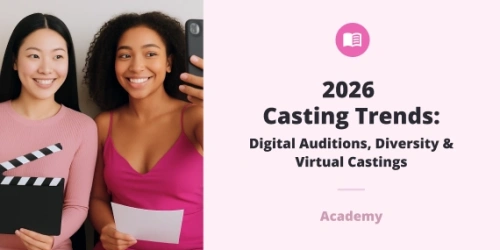When it comes to getting a job as an actor, aspiring performers get to know a whole new set of terminology involved with their chosen profession. In order to get acting jobs, one of the most important terms will end up being casting calls. Continue reading to learn about what exactly is a casting call and more.
- What Exactly Does The Casting Call Term Even Mean?
- Are All Casting Calls The Same?
- Where To Find New Casting Calls?
- How To Apply To Casting Calls?
- What Is Next After Submission?
What Exactly Does The Casting Call Term Even Mean?
As with any type of profession, even the creative art of acting requires looking for a job through a list of new job opening advertisements. The key difference is that before the absolute majority of actors are considered for hiring, they normally have to go through the casting process instead of a job interview.
So, this announcement, made with the specific purpose of finding actors for particular roles in various entertainment projects such as movies, TV series, ad commercials, theater stage productions, and more, is called a casting call.
Casting calls made available for the public normally should include information like the casting call date, the project type and synopsis of the project, the planned period of time during which production takes place, and the locations of it all. Often such information also will include compensation rates for those ultimately cast.
In a nutshell, a casting call is a pre-production process that serves as a job listing for actors to which they send in their applications to be potentially invited to audition for a particular role.
Are All Casting Calls The Same?
There are primarily two types of casting calls - an open casting call and a closed casting call.
An open casting call is the type that is available to anyone who meets the basic criteria. These requirements in the job listing are set by the casting director and the production team. Actors with any level of experience and representation can arrive for the open casting calls by using the information given, and participate in the process with hopes of getting to the next stage, and the gig itself.
A closed casting call is a type that is available only to those actors that are chosen by the casting director and the production team to receive an invitation to audition. Those who do not receive an invitation after applying should continue by looking for other casting calls.
Regardless of the type of casting call, one thing always remains the same - they are always used by the casting directors and production staff to evaluate acting talents to find the most fitting for the particular role by having the candidates perform in one or more auditions, thus showcasing their talents to make a case for being the right choice for the job
Where To Find New Casting Calls?
There are various ways to find new listings for casting calls. Actors who are working with a local acting agent or talent agency can receive information about new casting calls from them which is especially relevant from their skill set and experience. They can also help with the application process, from guidance to outright completing it for their client.
Acting schools, industry publications, and other relevant outlets also normally publish information about casting calls, which aspiring actors can use to apply.
Of course, the most convenient way to find new casting calls is online. Fortunately, there are quite a few casting-focused platforms available, including AllCasting, that are regularly updating with new casting call listings. Such online platforms may even allow users to search for new casting calls by filtering through their preferences, including locations and available dates. Also, email notifications based on those preferences may be available, so the performers do not miss out on casting call opportunities relevant to them.
Regardless of the way chosen for searching for casting calls, performers of all backgrounds and experience levels should try to stay updated on the listing news as a part of their daily chores.
How To Apply To Casting Calls?
Once an actor has carefully reviewed the details of a casting call to be sure it is relevant to what they are looking for, and have made the decision to apply, it is time to leave the very first impression and get all the required information in order.
Since this is a highly competitive industry, casting directors and their staff need initial information to enlist those who in their opinion possibly are the best fit for what they are looking for. So, typically the casting call application process requires that the candidates should send their acting portfolio. It should include professional headshots and relevant footage that showcases their acting skills, range, and versatility.
An acting resume also is a key part of a portfolio and should include a list of actors' professional experience, any relevant training and education, workshops attended, and more. Finally, an acting portfolio should include the performer's basic information, like age, gender, and contact information.
What Is Next After Submission?
It can go only two ways for actors who have submitted their applications to a casting call - a rejection, or, which is the obvious goal of any performer, an invite to the auditions.
In the fortunate case of receiving an invite, actors should thoroughly prepare for the upcoming challenge. Such preparations should normally include researching the project’s genre, style, and tone, to be able to understand the type of tone the casting director will be looking for in actors.
Actors should also follow any instructions given by the casting staff, including being punctual by following any and all deadlines. Candidates also sometimes may receive clothing requirements, e.g. to allow movement on the casting stage.
A respectful behavior and positive attitude towards the casting process can go a long way for candidates' chances, giving the staff the impression the actor is a professional and potentially easy to work with.
Even if things ultimately do not go as hoped for, actors should still be able to gain valuable insights from casting directors that can help them improve in the long run, and be successful with the next casting call opportunity.





